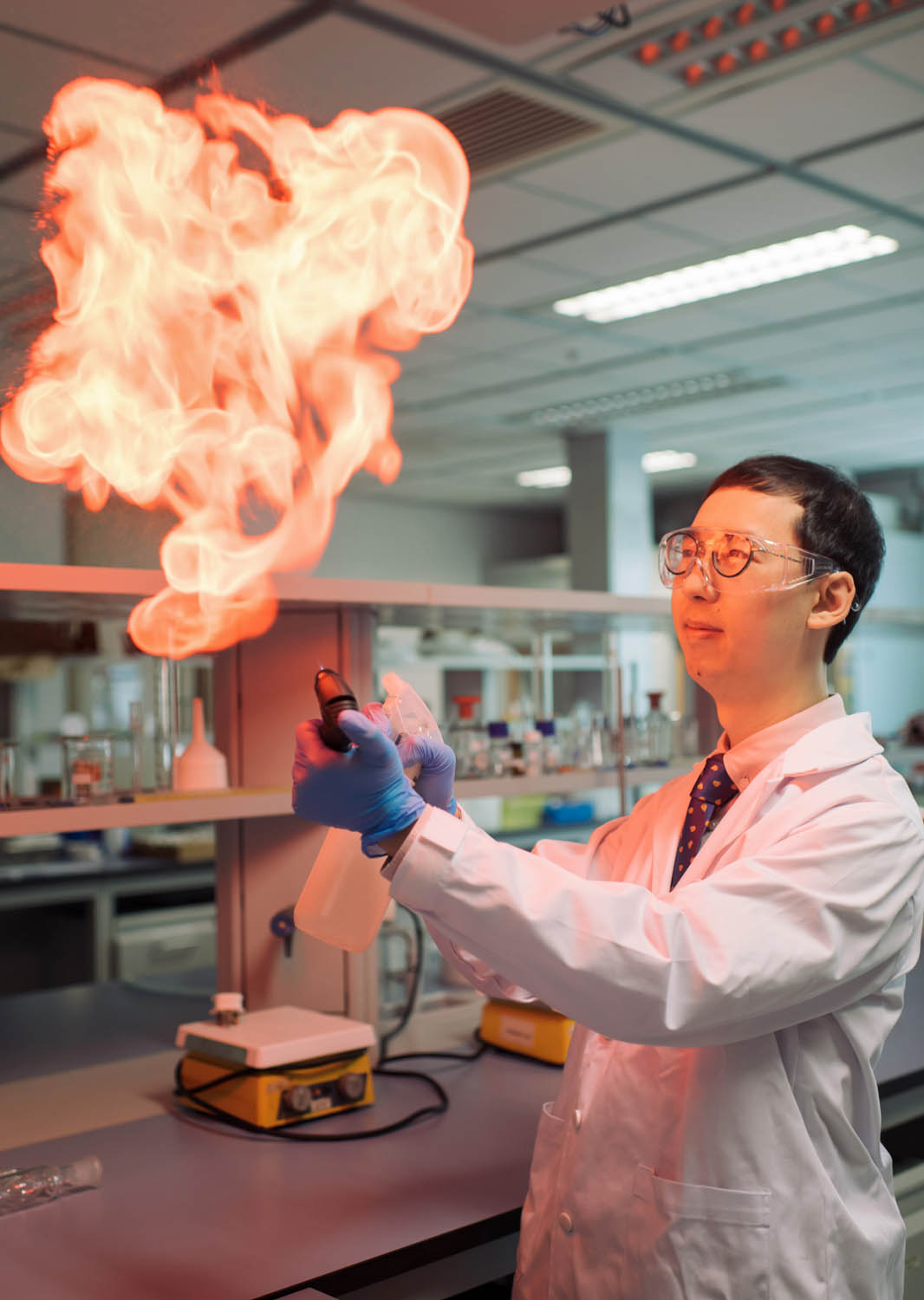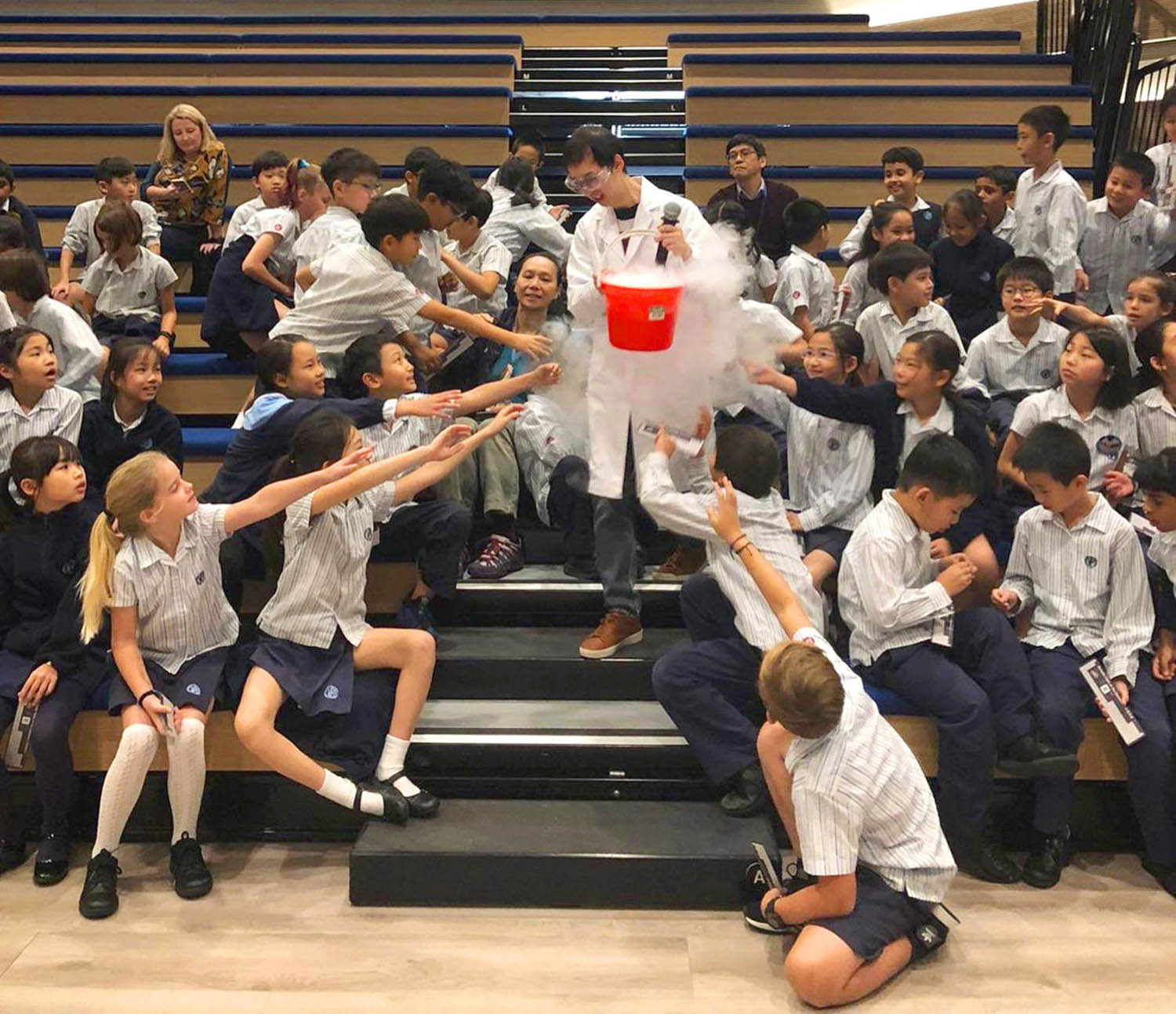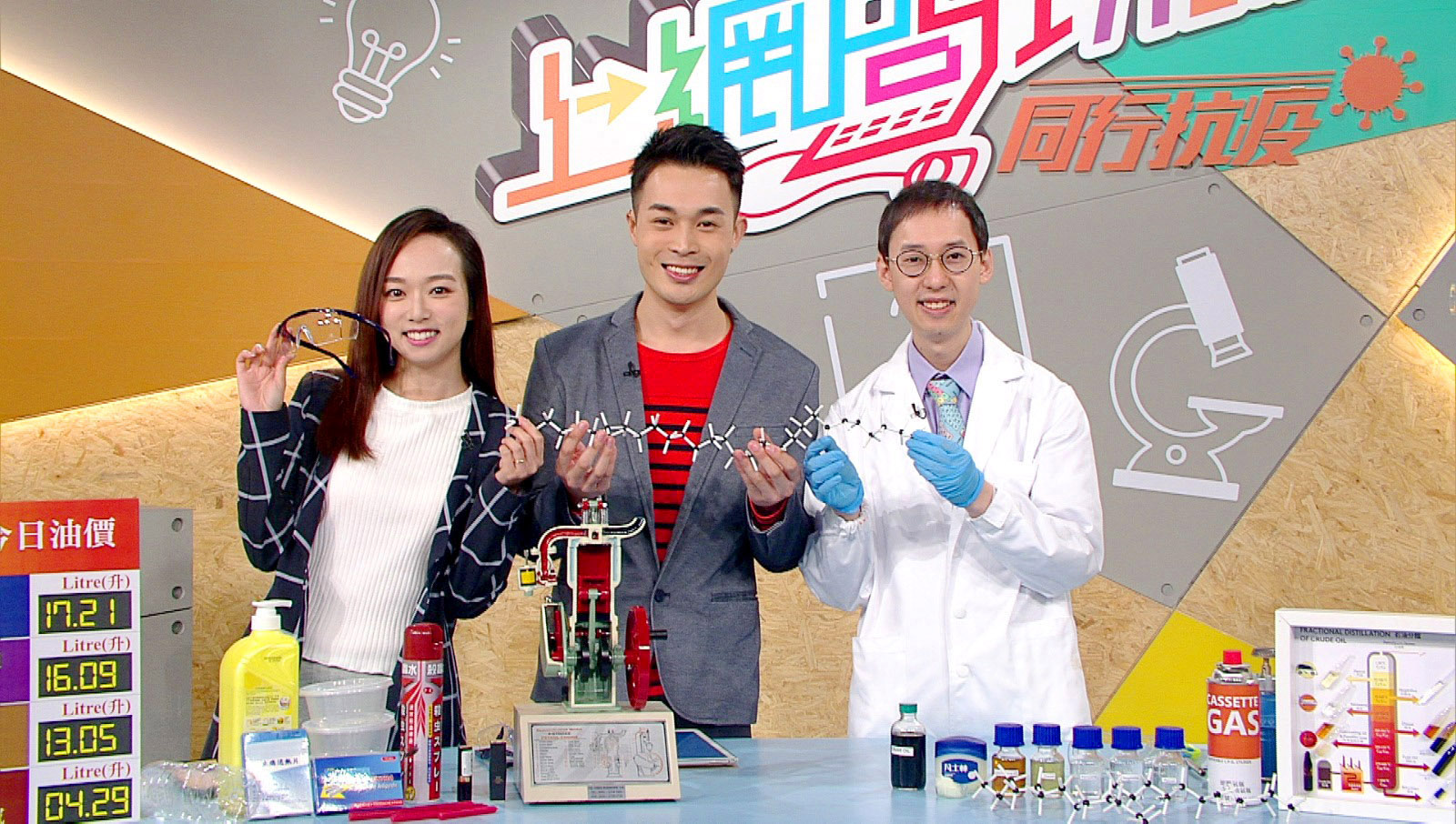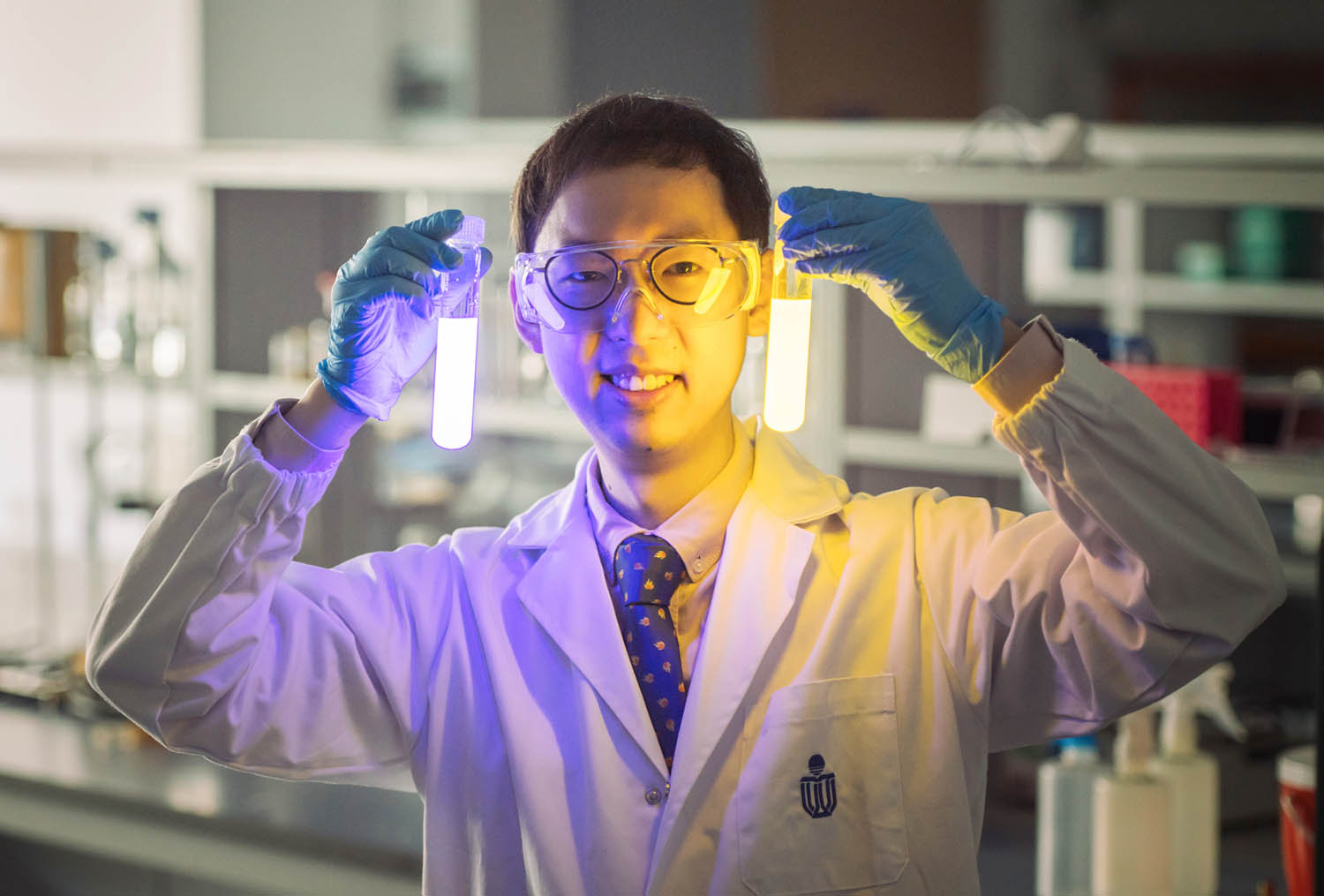

From kitchen chemist to television star, Dr Jason Chan, Assistant Professor of Science Education and Lecturer in the Department of Chemistry, talks about the role of chemistry in daily life, the importance of being a scientific citizen and his alter-ego, Dr Fire (火博士).
Bright Spark
As a teenager, most of Dr Jason Chan’s friends were into video games. But while they were saving for the latest release, Chan spent his pocket money on test tubes and chemicals to fill his ever-growing at-home laboratory, which was split across the bathroom and kitchen of his family home. Friends would come over and Chan would demonstrate various chemical reactions. It was the beginning of his journey to share his science knowledge.
When Chan went to England to attend boarding school, his knack for teaching came to the fore. As he advanced in seniority, he found himself performing experiments to younger students at school. While at university – he obtained Bachelor’s and Master’s degrees from the University of Cambridge – he was invited back to give demonstrations. His appearances stuck in people’s minds as he loved to light things on fire or blow things up. He was also attempting to ignite in his audiences a curiosity about chemistry. It was a recipe that would serve him well.
“I think one of the beautiful things about chemistry is that you can attract a lot of youngsters with the experiments. You can demonstrate beautiful reactions and amazing things. It’s a very visual science subject” says Chan. “I do demonstrations because I want to inspire the younger generation. Science has to grow from curiosity. I believe we can lure students into chemistry by attracting them with the spectacular stuff.”
Behind the spectacular there is, of course, a more serious side to chemistry, as Chan knows well. After graduating from Cambridge, he completed a PhD in Bioorganic Chemistry at the University of St Andrews, before, in 2014, returning to Hong Kong to join HKUST’s Department of Chemistry. Here, however, his role would not be bound by the serious nor would his reach be limited to the University’s lecture halls.
Sharing Science
A few months into Chan’s time at HKUST, TVB came knocking at the door of the Department of Chemistry with new ideas for a fun series centered on science education. They were looking for advice and possible collaborations. Discovering Chan’s penchant for demonstration experiments, they saw in him potential for the screen.
“They found out that I had the relevant skills. Nowadays, those classical demonstration experiments are not done as much and many professors don’t necessarily have the experience. Some of that tradition has perhaps been lost. However, I’ve tried a lot of them myself and I felt comfortable repeating them or trying new things,” says Chan, who would go on to appear on screen in the series Sidewalk Scientist as well as advising behind the scenes.
In Chan’s first episode, his character challenges the actress to set something alight without touching it. With his chemistry tricks his character is able to win the challenge. Nicknamed Dr Fire in the show, this designation endured and has followed him into his chemistry education outreach where he is an advocate for STEM education.
“This nickname allowed me to be easily recognized as a scientist by the general public, and kids especially remember me. The name has stuck and it helps to break the ice when I give talks outside the University.” says Chan.
Chan’s endeavors outside HKUST are wide-ranging, but one highlight took place in 2019, designated the International Year of the Periodic Table in celebration of its 150th anniversary. Chan partnered with the Hong Kong Science Museum to give a series of demonstration lectures covering the different parts of the periodic table. He was influenced by one of his own teachers, Dr Peter Wothers from the University of Cambridge, who in 2012 presented the acclaimed televised Christmas Lecture at the Royal Institution in London.

“I saw how he did these amazing talks and I wanted to follow in his footsteps to promote excellence in chemistry education,” says Chan. “His lectures were not just inspiring for non-chemists but for chemists too, because he does not only touch on technical elements but showcases them in a very spectacular way.”
During the Science Museum’s annual HK SciFest in 2019, Chan also organized a three-day pop-up stall at the museum where visitors could encounter samples of the elements and learn about their unique properties. He also designed a periodic table for the event, including photographs of his own element samples, which he has been collecting since he was a high school student.

Positive Reactions
Chan is always keen to showcase the importance of chemistry in daily life. “Chemistry is the science of the substances that make up the natural world. By studying and understanding chemistry, we can explain an awful lot about the world we live in,” he says.
Chan teaches a course titled Chemistry in Everyday Life, which won HKUST’s Common Core Teaching Excellence Award in 2016. When he took on the course on arrival at the University, he redesigned the syllabus to highlight chemistry’s everyday relevance. He also allowed students to really experience the subject, encouraging investigative group projects such as making slime, growing crystals and using various foodstuffs to make batteries. In one classic experiment, a lemon is used to power a battery, but Chan wanted his students to think outside the box replacing the lemon, for example, with a har-gow dim sum or an egg tart. “I asked them to spin traditional experiments and do something more innovative and see what happened and then to use their knowledge of chemistry to explain the results,” says Chan. He also gave students the opportunity to do a video project to showcase chemistry with drama and humor. “Because I’ve been in the media for some time, I realize how important and powerful it can be to communicate science through video.”
In 2018, Chan received the University Grants Committee Teaching Award, the money from which he is putting towards a new course called Chemistry in the Mass Media. “There’s so much pseudo-science on the internet and in the media. We have to be scientific citizens and think more logically and not just be blindly led by claims or advertisements,” says Chan. He hopes that the course will help to debunk fake science by providing students with opportunities to conduct laboratory experiments, literature research and surveys to find the truth behind certain claims and to encourage them to think like scientists and apply that thinking to real life. In an era of fake news, it will be a valuable addition to HKUST’s chemistry offering.

